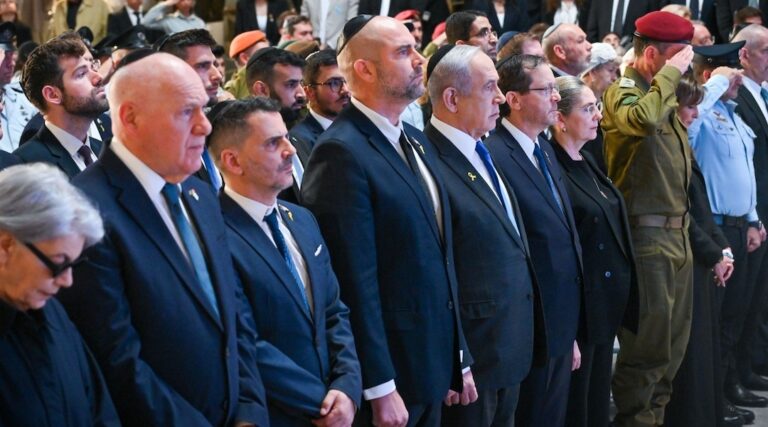(JTA) — Government officials faced protesters shouting “Shame!” and “Criminal!” as they delivered speeches at cemeteries throughout Israel. Shortly after, four Israeli soldiers were injured by missile fire from Lebanon.
Israel’s Memorial Day, which began on Sunday night, is always a somber occasion. However, this year’s commemoration of the country’s soldiers and victims of terror is particularly poignant due to the ongoing conflicts Israel is currently facing. With around 130 citizens still held captive in Gaza, Israel finds itself at war on two fronts.
Government statistics reveal that over 1,500 Israelis have lost their lives in war and terror attacks since the previous Memorial Day, known as Yom HaZikaron in Hebrew. The majority of these casualties occurred during Hamas’ initial attack on October 7, which sparked the ongoing war, as well as in subsequent clashes in Gaza over the following months. In total, over 25,000 soldiers and 5,000 civilians have been killed in wars and terror incidents in Israel’s history.
This year, the country’s divisions over whether to prioritize the conflict with Hamas or negotiate a hostage release were on full display. Several ministers from the right-wing government were met with protesters at cemetery memorial services, urging them to do more to secure the release of the hostages. Itamar Ben-Gvir, the far-right national security minister, faced accusations from protesters during a speech where he made no mention of the hostages. Defense Minister Yoav Gallant spoke in front of demonstrators holding signs that read, “Blood is on your hands.”
“Minister Smotrich, we must do everything to bring them back,” Einav Zangauker, whose son is among the hostages, implored Finance Minister Bezalel Smotrich in a video that captured the emotional moment. “Save those who are still alive.”
In the West Bank, right-wing Israeli protesters obstructed aid trucks destined for Gaza in an attempt to pressure for the release of the hostages. Four individuals were arrested for their actions.
During an official national ceremony, Israeli Prime Minister Benjamin Netanyahu emphasized unity and resolve in the fight against Hamas.
“This is the essence of the war: It’s us or them – Israel or the monsters of Hamas. It’s about our existence, freedom, security, and prosperity against annihilation, massacre, rape, and enslavement,” he stated. “The unity of our people and the support of the nation are the sources of our strength, along with understanding the importance of our battle at this critical moment.”
However, a survey indicated that the discontent towards government officials expressed by the protesters is shared by a significant portion of the population. Nearly half of Israelis surveyed believe that government ministers should not participate in cemetery memorial ceremonies. The majority of respondents also prefer a hostage release agreement over Israel’s military intervention in Rafah, a city in southern Gaza where Hamas forces are still present.
“On Memorial Day, we remember and grieve for the fallen hostages,” a statement from the Hostages and Missing Families Forum read. “Some have been returned to Israel for burial, but many remain captive in Gaza. We pledge to continue our efforts until all the fallen are laid to rest.”
This is the second consecutive year that Netanyahu’s cabinet ministers have faced protests on Memorial Day. Last year, similar scenes unfolded amid demonstrations against the government’s attempts to diminish the judiciary’s powers.
Israeli Memorial Day precedes Independence Day, with transition ceremonies marking the shift from mourning to celebration. However, this year’s Independence Day observance is expected to be more subdued. According to the survey, 56% of respondents prefer more restrained celebrations, while nearly a third believe the country should not celebrate at all.

